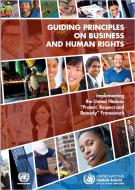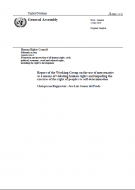Other international initiatives

Other documents and international standards or initiatives also deal with good governance of the private security sector, including:
The United Nations Guiding Principles on Business and Human Rights (UNGPs)
The United Nations has recognized that commercial activities can have negative human rights impacts and in 2005 created a ‘Working Group on the issue of human rights and transnational corporations and other business enterprises’. In 2008, this mandate culminated in the development of the ‘Protect, Respect and Remedy’ reference framework and its implementation framework: the United Nations Guiding Principles on Business and Human Rights (UNGPs), adopted in 2011. These principles are applicable to all branches of commercial activity, and thus also apply to private security.
The ‘Protect, Respect and Remedy’ reference framework is based on three pillars:
- The existing obligations of States to respect protect and implement human rights and fundamental freedoms;
- The role of companies as specialized bodies in society performing particular functions, required to comply with all applicable laws and to respect human rights;
- The need for rights and obligations to be accompanied by appropriate and effective remedies in case of violations.
Draft Convention on Private Military and Security Companies
In 2005, the Human Rights Council set up a ‘Working Group on the use of mercenaries as a means of violating human rights and impeding the exercise of the right of peoples to self-determination’. In 2010, this group submitted a Draft Convention to regulate the activities of private military and security companies.
Through Resolution 15/16, the United Nations Human Rights Council also established an open-ended intergovernmental working group to examine the possibility of developing an international regulatory framework for the regulation, supervision and oversight of the activities of private military and security companies, complementing the Draft Convention and considering the possibility of developing an international regulatory framework.
In 2017, the Human Rights Council Resolution 36/11 established a new open-ended intergovernmental working group, for a period of three years, to elaborate the content of an international framework to protect human rights and ensure accountability for abuses relating to the activities of private military and security companies.
Relevance for CSOs
The UNGPs are the overarching global framework that guides the behaviour of governments as well as corporations in terms of respecting human rights. The Draft Convention proposes international standards and its components can be used as good practice. These documents provide CSOs with a solid baseline reference and an anchor for their activities.
In particular, the UNGPs, which are internationally recognized by States and companies, provide CSOs with a framework for dealing with corporate responsibility, including PSCs, and to justify the requirement that commercial behaviour respects human rights. The UNGPs can be used by CSOs to remind PSCs of their responsibility to respect internationally recognized human rights, ensure that they are held accountable for human rights abuses and encourage them to improve their behaviour. By providing specific information on the implementation of the UNGPs, CSOs also contribute to improving the reference framework on business and human rights.
As part of their responsibility for the dissemination and implementation of the UNGPs, States are encouraged to adopt and implement national action plans (NAPs) for the implementation of the United Nations Guiding Principles on Business and Human Rights. CSOs can provide valuable support to States, both in the process of developing and implementing NAPs, and in particular can provide the necessary knowledge for the UNGPs to be locally appropriated and adapted to the national context. In some countries, such as Ghana, India, Nigeria and Tanzania, civil society organizations or national human rights institutions have taken the initiative towards developing a NAP.
Regulation and Oversight
Information about National Regulations and Regional and International Initiatives.

